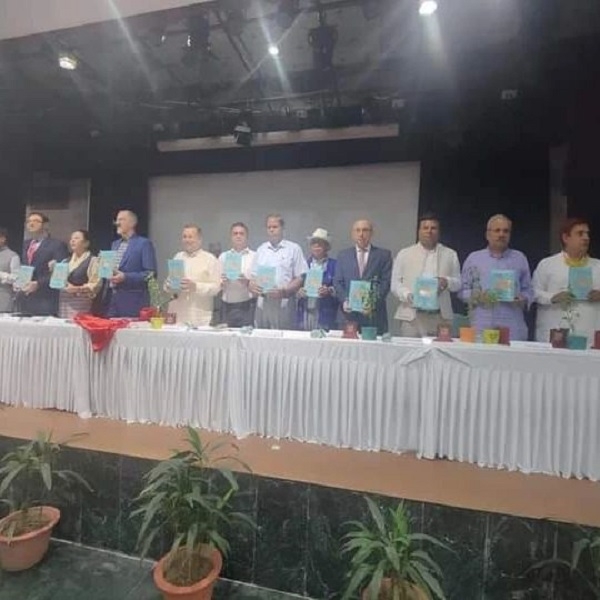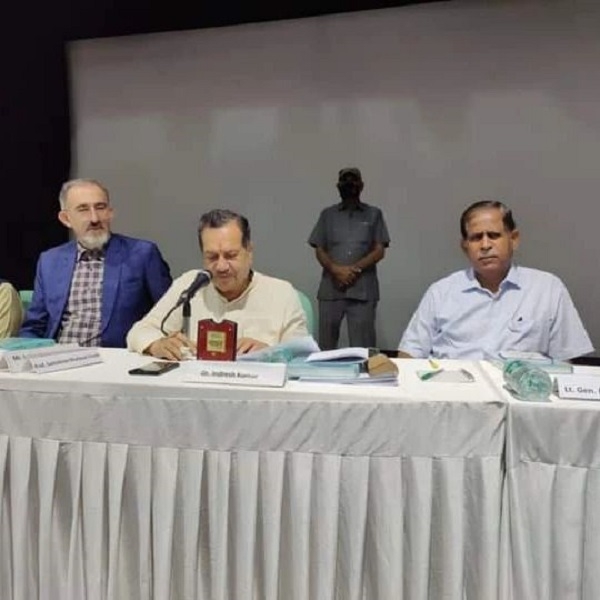Indresh Kumar highlights geo-political importance of HHRS countries
Total Views |

Dignitaries releasing the book at a function organized by FANS and JNU jointly in New Delhi
New Delhi, June 17: Highlighting the geo-political importance of Himalaya-Hind Mahasagar Rashtra Samuh (A group of 54 countries falling under the Himalaya and Indian Ocean), Indresh Kumar, Advisor and Patron of the Forum for Awareness of National Security (FANS) and member of RSS National Executive underlined that these countries had friendly, cordial and cooperative relations for thousands of years.
He was delivering a keynote address at the book release function held recently jointly by the FANS and the School of Language, Literature and Culture Studies, Jawaharlal Nehru University (JNU. The book titled: "Himalaya-Hind Mahasagar Rashtra Samuh: Revitalizing the Culture and Maritime Trade Relations" is edited by Prof. M. Mahtab Alam Rizvi, Shri Golok Behari Rai and Shri Rajneesh Tyagi.
Score of foreign diplomats and dignitaries were present at the book release and the discussion that followed on “India’s Resilience Strength: Challenges in the New Global Order” and shared their views also.
Prominent among those present at the function included H.E.D. Dr. Ashraf Shikhaliyev (Ambassador of the Republic of Azerbaijan to India), H.E. Lukman Bobokalonzoda (Ambassador of the Republic of Tajikistan to India), H.E. Mr. Farid Mamundzay (Ambassador of the Islamic Republicof Afghanistan to India), H.E. Mr. Akhatov Dilshad (Ambassador of Uzbekistan to India), H.E. Dr. Ehsanollah Shakrollahi (Director of Persian Research Centre, Iran Culture House), H.E. Dr. Mumin Chen (Deputy Representative of Taipei Economic and Cultural Center (TECC) in India), Smt. Gyari Dolma Home Minister Central Tibetan Administration, Dharamshala, Prof. Shahid Akhter , (Member , National Commission for Minorities Educational Institutions , Government of India), Prof. Santishree Dhulipudi Pandit,(Hon’bleVice Chancellor, JNU, New Delhi), Prof. Sachin Gupta, Hon’ble Chancellor, Sanskriti University, Mathura, Shri Talo Mugali, Chairman- Forest Corporation, Arunachal Pradesh Government, Shri Golok Behari Rai, Lt Gen (retd) R.N. Singh (President of FANS), Prof. Mazhar Ashif, Prof. Mahtab Alam Rizvi, Shri Rajneesh Tyagi, (General Secretary of FANS).
Participating in the discussion the Ambassadors of the various countries of the region have also delivered their special address on “Culture and Maritime Trade Relations between India and the Countries of the Himalaya-Hind Mahasagar Rashtra Samuh”.
FANS Organizing Secretary Golok Behari Rai shared his ideas on Himalaya-Hind Mahasagar Rashtra Samuh. He focused on the cultural and maritime trade significance of Himalaya-Hind Mahasagar Rashtra Samuh, which includes 54 countries and almost 40% of the total world population.
Rai said that this concept was not created on the basis of violence, materiality and militarization or trade and commerce, but purely on cultural and human values. He emphasised on the point that traders used to be the cultural ambassadors who helped in building a cultural connection with different nations of that time.
Talking about the importance of Hind Mahasagar, he said, metaphorically the Sun never set in the nation, who had control over it because it was a symbol of prosperity. The name of Hind Mahasagar was changed time and again by colonial powers to dilute this cultural unity. He said this idea is and will get its due importance in near-future and it is time for these 54 countries to create a collective identity as Himalaya-Hind Mahasagar Rashtra Samuh.
Dr. Ashraf Shikhaliyev congratulated the editors and contributors of the book. He gave a brief account of the relationship between Azerbaijan and India. He said in Azerbaijan, Indian culture and knowledge are highly valued. He also discussed some of the initiatives and developments made by both the countries.
Mr. Farid Mamundzay, in his address, highlighted the importance of JNU in providing educational support to Afghan students and scholars. He highlighted the old tradition that both the countries share. He gave a brief explanation about the importance of India’s maritime history by quoting the concept of Jambudvīpa (cluster of islands) from the Mahabharata.
According to him, India has a potential and significant maritime presence in the world. He made a remarkable point that in the 21st century, global responses are required for global challenges.
Dr. Ehsanollah Shakrollahi in his brief address highlighted the long history of maritime culture and trade. He also shed light on the cultural relations of Iran and India. He quoted William Durant’s view that India was a “cradle of civilization” because of which the idea of Himalaya-Hind Mahasagar Rashtra Samuh is very significant. He said the fame of this book will reach Iran very soon.
Gyari Dolma talked about India’s position in the present global platform. She said that we live in an inter-dependent world and in today’s geo-political scenario, India is the hand that we can hold and trust for greater good of the mankind and for everyone’s prosperity.

Indresh Kumar delivering keynote address at the function. FANS President Gen (Retd) R N Singh looks on
In his keynote address Indresh Kumar enlightened the audience about the significance of Himalaya-Hind Mahasagar Rashtra Samuh and its importance in the present geo-political situation. He gave a detailed explanation of the causes of conflict and violence in the world by citing examples from all over the world. According to him, 40% of the world is in constant conflict because of the vested interests of some people.
He opined that the irony of the situation is that everybody talks about peace but they are in constant conflict. He also spoke about the spiritual significance of the Himalayas and India as a land of spiritualism.
Commenting on the present situation, he said India is the only country which is considered as the Vishwa-Guru (a country that has potential to lead the world). According to him no other country has such a widespread acceptance as a world leader. He also spoke about the importance of Hind Mahasagar as a trade route and said that it stands for prosperity. He also asked the audience to ponder over the concept of Himalaya-Hind Mahasagar Rashtra Samuh and think about its role in the current geo-political situation.
Dr. Indresh Kumar highlighted that the concept of Himalaya-Hind Mahasagar Rashtra Samuh (HHRS) consists of 54 countries of Africa and Asia. When you look at these, it will come to your mind that these countries had friendly and cooperative relations for thousands of years. Some evidence of this, is found in known and unknown history in these countries. For example, if you refer to the Ramayana period, the left and the west historians have divided history into ten fifteen and twenty thousand years, but the countries of the Himalaya-Hind Mahasagar Rashtra Samuh has seen the history of the various countries and goes back to millions of years.
At the time when Sita was kidnapped by Lankapati Demon King Ravana, the armies moved to search for Mother Sita, after taking blessings and guidance from the Vanara King Sugreev and Lord Rama. He described these countries and their culture and history to the search parties. Their language, customs, their forests, their conduct, thoughts and practices, the kind of rulings and power they had at that time: all evidence have been found. The tribal armies, rural environment and the small towns, migrating from cities to cities, forests, mountains, caves, etc., all the evidence were also found in these countries.
Similarly, even during the Mahabharata period, the references about the Mahabharata war of Kurukshetra, are found in their historical texts in almost all these countries. So, in all these countries, there is not only a harmony towards Ram's character and towards the scales of Krishna and his skills, but also a variety of evidences were found.
Indresh Kumar further said that the HHRS is created with the same kind of emotion that has been going on for ages, so that the borders will remain, but there will be no attack on each other. We will also respect each other's borders, live in cooperation with each other. 'Model of one world without conflict, without crime' may be developed. Those who are weak, backward, unhappy countries, all the helping hands will be extended to these countries, such model is known as ‘Vasudhaiva Kutumbakam'. Where castes will remain, but there will be no untouchability, gender will remain, but there will be no discrimination of men and women, various religious followers, but no criticism, no conversion. There will be a sense of respect for each other's beliefs, not righteousness.
India's path of self-sufficiency is more important than securing the market of all these countries from foreign goods to become a self-reliant market, he said. There is a sense of cooperation and not an attempt to exploit it. Therefore, an important and beautiful effort was made by the FANS in the form of Himalaya-Hind Mahasagar Rashtra Samuh, he concluded congratulating the authors and the FANS for organizing such a beautiful program.

